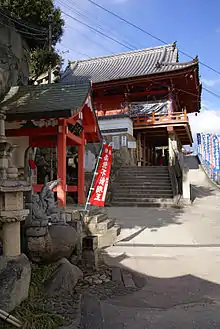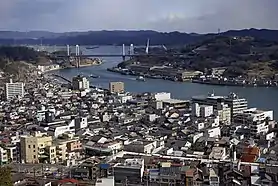Onomichi
尾道市 | |
|---|---|
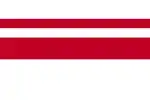 Flag  Seal | |
Location of Onomichi in Hiroshima Prefecture | |
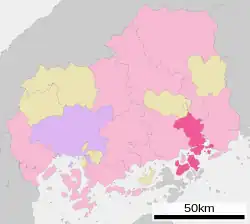 | |
 Onomichi Location in Japan | |
| Coordinates: 34°25′N 133°12′E / 34.417°N 133.200°E | |
| Country | Japan |
| Region | Chūgoku (San'yō) |
| Prefecture | Hiroshima Prefecture |
| Government | |
| • Mayor | Yuko Hiratani |
| Area | |
| • Total | 285.11 km2 (110.08 sq mi) |
| Population (March 31, 2023) | |
| • Total | 129,314 |
| • Density | 450/km2 (1,200/sq mi) |
| Time zone | UTC+09:00 (JST) |
| City hall address | 1-15-1 Kubo, Onomichi-shi, Hiroshima-ken 722-8501 |
| Climate | Cfa |
| Website | www |
| Symbols | |
| Flower | Sakura |
| Tree | Sakura |
Onomichi (尾道市, Onomichi-shi) is a city located in Hiroshima Prefecture, Japan.
As of 31 January 2023, the city had an estimated population of 129,314 in 64055 households and a population density of 450 persons per km².[1] The total area of the city is 285.11 square kilometres (110.08 sq mi).
Geography
Onomichi is located in southeastern Hiroshima Prefecture. It faces the Seto Inland Sea to the south, and the coastline is intricate and forms part of the Setonaikai National Park. The main urban concentration is in a narrow band on the coast, where there is very little flat land. Because of its unique scenery, it is often used as a filming location for movies.
Adjoining municipalities
Climate
Onomichi has a humid subtropical climate (Köppen climate classification Cfa) characterized by cool to mild winters and hot, humid summers. The average annual temperature in Onomichi is 15.9 °C (60.6 °F). The average annual rainfall is 1,138.4 mm (44.82 in) with July as the wettest month. The temperatures are highest on average in August, at around 27.5 °C (81.5 °F), and lowest in January, at around 5.7 °C (42.3 °F).[2] The highest temperature ever recorded in Onomichi was 37.5 °C (99.5 °F) on 5 August 2021; the coldest temperature ever recorded was −6.3 °C (20.7 °F) on 26 February 1981.[3]
| Climate data for Ikuchi-jima, Onomichi (1991−2020 normals, extremes 1979−present) | |||||||||||||
|---|---|---|---|---|---|---|---|---|---|---|---|---|---|
| Month | Jan | Feb | Mar | Apr | May | Jun | Jul | Aug | Sep | Oct | Nov | Dec | Year |
| Record high °C (°F) | 16.4 (61.5) |
20.4 (68.7) |
22.2 (72.0) |
27.5 (81.5) |
32.0 (89.6) |
34.2 (93.6) |
36.0 (96.8) |
37.5 (99.5) |
36.0 (96.8) |
33.0 (91.4) |
25.1 (77.2) |
20.9 (69.6) |
37.5 (99.5) |
| Mean daily maximum °C (°F) | 9.5 (49.1) |
9.9 (49.8) |
13.0 (55.4) |
18.1 (64.6) |
22.9 (73.2) |
26.0 (78.8) |
30.0 (86.0) |
31.9 (89.4) |
28.3 (82.9) |
22.8 (73.0) |
17.2 (63.0) |
11.9 (53.4) |
20.1 (68.2) |
| Daily mean °C (°F) | 5.7 (42.3) |
5.8 (42.4) |
8.6 (47.5) |
13.4 (56.1) |
18.1 (64.6) |
21.8 (71.2) |
25.9 (78.6) |
27.5 (81.5) |
24.1 (75.4) |
18.6 (65.5) |
12.9 (55.2) |
8.0 (46.4) |
15.9 (60.6) |
| Mean daily minimum °C (°F) | 1.6 (34.9) |
1.3 (34.3) |
3.8 (38.8) |
8.5 (47.3) |
13.4 (56.1) |
18.2 (64.8) |
22.5 (72.5) |
24.0 (75.2) |
20.6 (69.1) |
14.6 (58.3) |
8.7 (47.7) |
3.8 (38.8) |
11.8 (53.2) |
| Record low °C (°F) | −4.7 (23.5) |
−6.3 (20.7) |
−4.0 (24.8) |
−1.2 (29.8) |
3.4 (38.1) |
9.8 (49.6) |
15.6 (60.1) |
17.4 (63.3) |
11.4 (52.5) |
4.7 (40.5) |
−0.6 (30.9) |
−3.0 (26.6) |
−6.3 (20.7) |
| Average precipitation mm (inches) | 39.5 (1.56) |
49.7 (1.96) |
84.4 (3.32) |
88.9 (3.50) |
108.3 (4.26) |
172.3 (6.78) |
177.6 (6.99) |
89.5 (3.52) |
126.8 (4.99) |
95.9 (3.78) |
59.2 (2.33) |
46.2 (1.82) |
1,138.4 (44.82) |
| Average precipitation days (≥ 1.0 mm) | 5.3 | 6.9 | 9.2 | 9.1 | 8.5 | 10.8 | 9.1 | 6.2 | 8.5 | 7.0 | 6.2 | 6.3 | 93.1 |
| Mean monthly sunshine hours | 141.9 | 140.1 | 177.0 | 192.1 | 206.5 | 149.7 | 189.9 | 220.7 | 163.7 | 169.8 | 146.2 | 140.8 | 2,047.1 |
| Source: Japan Meteorological Agency[3][2] | |||||||||||||
Demographics
Per Japanese census data, the population of Onomichi in 2020 is 131,170 people.[4] Onomichi has been conducting censuses since 1960.
| Year | Pop. | ±% |
|---|---|---|
| 1950 | 185,084 | — |
| 1955 | 183,338 | −0.9% |
| 1960 | 182,497 | −0.5% |
| 1965 | 181,038 | −0.8% |
| 1970 | 183,325 | +1.3% |
| 1975 | 185,503 | +1.2% |
| 1980 | 180,901 | −2.5% |
| 1985 | 177,532 | −1.9% |
| 1990 | 166,930 | −6.0% |
| 1995 | 159,890 | −4.2% |
| 2000 | 155,200 | −2.9% |
| 2005 | 150,225 | −3.2% |
| 2010 | 145,217 | −3.3% |
| 2015 | 138,626 | −4.5% |
| 2020 | 131,170 | −5.4% |
| Onomichi population statistics[4] | ||
History
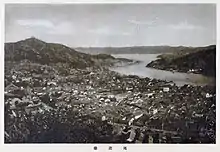
- 1168: The city's port opened and for the next 500 years served as a rice shipment center and port for all trades with foreign countries. Its commercial significance somewhat wavered during the Tokugawa period.
- 1898: Onomichi Town in Mitsugi District becomes the second city in Hiroshima Prefecture on April 1.
- 1935: The RMS Adriatic was scrapped in Onomichi.
- 1937: The town of Kurihara and the village of Yoshiwa, both in Mitsugi District incorporated.
- 1939: The village of Sanba from Numakuma District incorporated.
- 1951: The village of Fukada from Mitsugi District incorporated.
- 1954: Three villages from Mitsugi District incorporated.
- 1955: Three villages from Numakuma District incorporated.
- 1957: The village of Urasaki from Numakuma District incorporated.
- 1970: The town of Mukaihigashi from Mitsugi District incorporated.
- March 28, 2005: The towns of Mitsugi and Mukaishima (both from Mitsugi District) were merged into Onomichi.
- January 10, 2006: The towns of Innoshima and Setoda (both from Toyota District) were merged into Onomichi.
Government
.jpg.webp)
Onomichi has a mayor-council form of government with a directly elected mayor and a unicameral city council of 26 members.Onomichi contributes three members to the Hiroshima Prefectural Assembly. In terms of national politics, the city is divided between the Hiroshima 5th district and Hiroshima 6th district of the lower house of the Diet of Japan.
Crime and safety
The Kyodo-kai yakuza syndicate is based in Onomichi.[5] The Kyodo-kai is the second largest yakuza group in the Chugoku region after the Hiroshima-based Kyosei-kai.[6]
Economy
Onomichi has prospered as a port town and a commercial city. Before World War II, it had an economy comparable to that of Hiroshima City. Shipyards have existed in Onomichi, Mukaishima, and Innoshima for a long time due to their location, which is blessed with water transport. In recent years, the shipbuilding industry has been in decline due to the decline of the industry.
Manufacturing
Shipbuilding[7]
- Naikai Shipbuilding
- Mukaishima Dock
- Onomichi Dockyard
- Universal Shipbuilding Onomichi dock
- Hitachi Zosen Corporation Onomichi dock
- JFE Shoji Trade Shipbuilding
- Tsuneishi Shipbuilding
Metalworking
- Press Kogyo
- Union Plate Onomichi plant
Chemistry
- Nitto Denko Onomichi plant
- Yokohama Rubber Company Onomichi plant
Agriculture
Fishery
Media
- Onomichi FM
- Onomichi Cable Television
Bookselling
- Keibunsha
Education
Onomichi features 24 public elementary schools, 16 public junior high schools, and one public high school operated by the City Government. Additionally, six public high schools fall under the administration of the Hiroshima Prefectural Board of Education. The city also hosts one private middle school and one private high school, contributing to a diverse educational landscape. Moreover, the prefecture operates two special education schools for individuals with disabilities.
Transportation
Railway
![]() JR West (JR West) - San'yō Main Line
JR West (JR West) - San'yō Main Line
Highways
 San'yō Expressway
San'yō Expressway Onomichi Expressway
Onomichi Expressway Nishiseto Expressway (also known as the "Shimanami Kaidō")
Nishiseto Expressway (also known as the "Shimanami Kaidō") National Route 2
National Route 2 National Route 184
National Route 184 National Route 317
National Route 317 National Route 486
National Route 486
Sister city relations
 Imabari, Ehime, Japan
Imabari, Ehime, Japan Higashiizumo, Shimane, Japan
Higashiizumo, Shimane, Japan
 Honfleur, France
Honfleur, France.svg.png.webp) Jung District, Busan, Korea
Jung District, Busan, Korea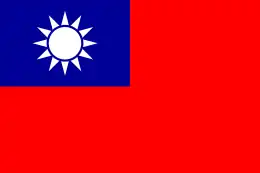 Chiayi, Taiwan
Chiayi, Taiwan Taichung, Taiwan
Taichung, Taiwan
Local attractions
The city is known for its many temples such as the Buddhist Senkō-ji Temple (founded in the 9th century), has a shipbuilding yard and a motor factory. It offers a steamship service to ports of northern Shikoku and islands in the Inland Sea.[8]
Temples
- Senkō-ji – Chūgoku 33 Kannon Pilgrimage No. 10[9]
- Kōmyō-ji[10]
- Tennei-ji[11]
- Jōdo-ji – Chūgoku 33 Kannon Pilgrimage No. 9[12]
- Saigō-ji
- Saikoku-ji – Chūgoku 33 Kannon Pilgrimage[13]
- Kongō-ji
- Kōsan-ji in Setoda, Hiroshima[14]
- Kōjō-ji in Setoda – Chūgoku 33 Kannon Pilgrimage No.11[15]
- Jikō-ji[16]
- Kaifuku-ji
- Jōsen-ji
- Syōjyu-in
- Jikan-ji
- Myōsen-ji
- Taisan-ji
Shrines
- Misode-tenman-gū[17]
- Ushitora Shrine – the oldest shrine in Onomichi
- Kubohachiman Shrine
Castles
- Innoshima Suigun Castle[18]
- Onomichi Castle
- Fukuyama Domain Bansho site
Parks and gardens
- Senkoji Park on Mt. Senkoji – connected by Senkōji Ropeway from Onomichi Station
- Senkoji Park Green Land (1965–2007)
- Bingo Regional Sports Park
- Onomichi Shimanami Baseball Stadium – NPB game held twice a year as Hiroshima Carp home game.
- Mukaishima Orchid Center
- Innoshima Flower Center
- Citrus Park Setoda
- Innoshima Ohashi Memorial Park
- Mt. Takami National Park
- Tachibana Nature Village
- The Island's Blooms – The Pyrethrum[19]
- Hyakka Park
- Souraiken Garden
- Mitsugi Greenland
- Marine Youth Center
- Mitsugi Softball Ballpark
- Chojabara Sports Center
- Mukaishima Sports Park
- Innoshima Sports Park
- Innoshima Amenity Pool
- Kaibutsu-en Ato (The remains of Kaibutsu-en) – The garden of the House of Tomishima (Tenmaya)
Museums
- Onomichi City Museum of Art
- Ikuo Hirayama Museum of Art – by named after Ikuo Hirayama
- Musee Nakata
- Onomichi Literature Museum
- Entsuba Katsuzo Sculpture Museum
- Honinbo Shusaku Igo Memorial Museum – by named after Honinbo Shusaku
- Museum of Setoda History and Folklore
- Onomichi Historical Museum
- Innoshima History Museum
- Island-Wide Art Museum
- Onomichi Motion Picture Museum
Beaches
- Shimanami Beach
- Ohamasaki Camp Site
- Setoda Sunset Beach
- Setoda B & G Marine Center
- Tachibana Beach
- Iwashijima Beach on Iwashijima Island
Hot springs
- Natural Spa Onomichi Fureai no Sato
- Mitsugi Yu Yu-Kan
- Harada-cho Yujin Hot spring
- Yoro onsen
Others
- Literature Path
- Nishiseto Expressway – "Shimanami Expressway" connects Onomichi and Imabari, Ehime
- Innoshima Suigun Skyline
- Kaneyoshi Bus Stop
- Statue of Fumiko Hayashi
- Onomichi City Library
- Tsureshio Stone Monuments
- Shimanami Koryu-kan – "Teatro Shell-rune"
- Bel Canto Hall
- Crossroad Mitsugi
Festivals
- Onomichi Minato Matsuri – the Port Festival – April
- Onomichi Sumiyoshi Hanabi Matsuri – Fireworks – the last Sunday of July
- Innoshima Suigun Matsuri – at Suigun Castle – August
- Onomichi Betcha Matsuri – November 1–3
In popular culture
The city is featured in the Japanese film Tokyo Story (1953) directed by Yasujirō Ozu. It is the setting for the fantasy 2005 anime series Kamichu! which faithfully depicts many of the city's features and landmarks. Events of the Blue Drop series also happen in this city. It is also the setting of the romantic manga Pastel by Toshihiko Kobayashi. The video game Yakuza 6: The Song of Life heavily features Onomichi as an in-game location, and its fictional mascot, Ono Michio.
Books
- A Dark Night's Passing (1921) by Naoya Shiga
- Diary of a Vagabond (1930) by Fumiko Hayashi
- The Accordion and the Fish Town (1931) by Fumiko Hayashi
- Akumyō (1961) by Toko Kon
Films
- Tokyo Story by Yasujirō Ozu (1953)
- Films by Kaneto Shindō
- Kanashimi wa onna dakeni (1958)
- The Naked Island (1960)
- Akumyō series by Tokuzo Tanaka, Kazuo Mori, Kimiyoshi Yasuda, Masahiro Makino, Yasuzo Masumura, Seiji Izumi (1961–2001)
- Nikui an-chikushô by Koreyoshi Kurahara (1962)
- Boy by Nagisa Oshima (1969)
- Films by Nobuhiko Obayashi
- Exchange Students (1982)
- The Little Girl Who Conquered Time (1983)
- Lonely Heart (1985)
- Chizuko's Younger Sister (1991)
- Goodbye for Tomorrow (1995)
- One Summer's Day (1999)
- His Motorbike, Her Island (1986)
- Bound for the Fields, the Mountains, and the Seacoast (1986)
- The Stupid Teacher (1998)
- Yamato by Junya Sato (2005)
Drama
- Teppan (2010)
- A Girl & Three Sweethearts (2016)
Manga
- Hikaru no Go (1998–2003)
- Parallel (2000–2002)
- Pastel (2002–2017)
- Shimanami Tasogare by Yuhki Kamatani (2015–2018)
Anime
- Kamichu! (2005–2007)
- Blue Drop (2007)
- Pon no Michi (2024)
Video games
- Yakuza 6: The Song of Life (2016)
- Between the Sky and Sea (2017–2019)
Notable people from Onomichi
Musicians
Go players
TV
Sports
Authors/artists
Voice Actor
References
- ↑ "Onomichi city official statistics" (in Japanese). Japan.
- 1 2 気象庁 / 平年値(年・月ごとの値). JMA. Retrieved March 2, 2022.
- 1 2 観測史上1~10位の値(年間を通じての値). JMA. Retrieved March 2, 2022.
- 1 2 "Hiroshima (Japan): Cities, Towns and Villages in Prefecture - Population Statistics, Charts and Map". www.citypopulation.de.
- ↑ "2010 Police White Paper Chapter 2 : Furtherance of Organized Crime Countermeasures", 2010, National Police Agency (in Japanese)
- ↑ "The Second Kyodo-kai", 20 February 2008, Matsue Joho Center (in Japanese)
- ↑ https://www.city.onomichi.hiroshima.jp/kaijitoshi/pdf_e/e9.pdf
- ↑ Hoffart, Jackie, "Nice to nestle at Japan's hometown", The Japan Times, 3 October 2008, p. 24.
- ↑ "Senkoji Temple (English)".
- ↑ "Komyobo Temple (English)".
- ↑ "Tenneiji Temple (English)".
- ↑ "Jodoji Temple (English)".
- ↑ "Saikokuji Temple (English)".
- ↑ "Kosanji Temple (English)". Archived from the original on July 21, 2011.
- ↑ "National Treasure Kojoji Temple (English)".
- ↑ "Jikoji Temple (English)".
- ↑ "Misode Shrine in English".
- ↑ "Onomichi City Tourist Spots (English)".
- ↑ "Onomichi City Tourist Spots (English)".
External links
- Onomichi City official website (in Japanese)
- Onomichi City official website (in English)
- Onomichi's Coordinator for International Relations website (in English)
